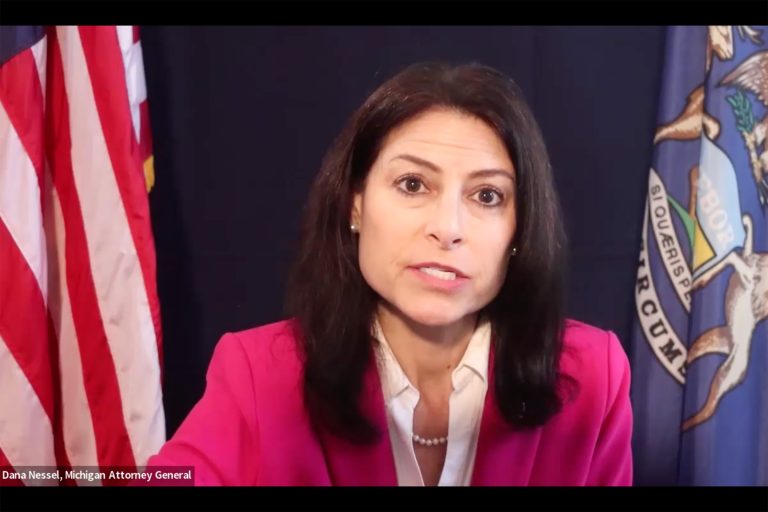Content Warning: This article contains references to gun violence and domestic violence.
Michigan's first Gun Violence Prevention Summit was held virtually Monday and Tuesday, with nearly 800 people in attendance. The event included a series of panel discussions and speeches from Michigan elected officials and student activists in response to the package of gun violence prevention legislation passed by the Michigan Legislature and Governor Gretchen Whitmer last year. The conversations centered around the most recent mass shootings in Michigan, including those at Michigan State University in February 2023 and Oxford High School in November 2021. The summit was co-sponsored by End Gun Violence Michigan and the University of Michigan Institute for Gun Injury Prevention , and the Johns Foundation. Hopkins Center on Gun Violence and Joyce Foundation.
Lt. Governor Garlin Gilchrist II thanked attendees for attending the summit and taking an active role in ending the cycle of gun violence that exists in Michigan during his opening remarks.
“You are all in the business of saving lives,” Gilchrist said. “Every gun death in Michigan, in America, in the world, is 100% preventable. That means we have the power to stop all of this death in all of our communities, no matter which community you live in.
Gun violence prevention measures signed last year are scheduled to take effect in February. Gilchrist thanked all gun regulation advocates across Michigan who helped turn the legislation package into law.
“In Michigan, here in 2024, we will all now know each other as people who live in a state where gun violence prevention measures will be in place,” Gilchrist said. “The action was taken thanks to the leadership of youth, the leadership of teachers and educational professionals, the leadership of religious leaders, the leadership of community organizers and the leadership of residents, who are sick and tired of being afraid all the time.” Time means we deliver the work.
Jada Knight, digital director of No Future Without Today, led a Monday afternoon session on student activism and the new package of gun violence prevention laws. Knight spoke about the power of students and their role in political decision-making.
“We are tasked with disrupting a system that prioritizes the arms industry and political interests over the lives of children,” Knight said. “We are tasked with proving to legislators that the lives of their constituents are more important than whether they win the next election or vet donors.”
Elected officials, including State Sen. Rosemary Bair, D-Royal Oak, State Rep. Lori Bohutsky, D-Livonia, and State Sen. Stephanie Chang, D-Detroit, discussed legislation related to background checks, safe gun storage, and high-risk protection. Orders and domestic violence.
Bohutsky spoke about the effectiveness of extreme risk protection orders, which allow law enforcement to confiscate firearms from any individual determined to pose a danger to themselves or others. Bohutsky discussed how the “Red Flag Law,” which Whitmer signed, prevents a potentially dangerous situation from escalating before it even happens.
“(Extreme risk protection orders) buy some time and put some distance between a bad situation and a gun,” Bohutsky said. “(Law enforcement) can build community trust without locking people up.”
Attorney General Dana Nessel (D) emphasized her legal background while opening the second day of the summit, saying she has been working within Michigan's legal system her entire career to help reduce gun violence.
“As Michigan’s top law enforcement agent, as well as a former Wayne County Assistant Prosecutor, and as a mother, I am also outraged and disgusted that thousands of Michiganders fall victim every year to this senseless and preventable gun scourge.” “Violence in our state,” Nessel said.
The package includes legislation that would mandate universal background checks, require secure home storage of firearms and implement red flag laws. Nessel said she is proud to make these policies a reality, especially after interacting with so many people deeply impacted by gun violence.
“I can vividly remember speaking with devastated parents and classmates of the victims of the shootings at Oxford and Michigan State University…who begged me for lawmakers to take stronger gun laws,” Nessel said. “Frankly, those who were in power, even just a few years ago, flatly refused to consider any of the group’s proposals.”
On Tuesday, the summit included panelists who spoke about youth leadership, democracy, and protecting domestic violence survivors and students.
MSU student Saylor Reinders, co-leader of the MSU Students Demand Action chapter, said her involvement in the gun violence prevention movement was motivated by the MSU shooting and the spread of gun violence across the country. When asked about the missing elements in the discourse on gun violence prevention, Reynders said community apathy hinders systemic change.
“The one part I feel is missing from the conversation is culture change,” Reinders said. “Because we talk a lot about laws that need to be passed, and laws are very important, but I think cultural change can complement those laws.”
Rajen Head, founder of Voice Detroit, said politicians need to transcend partisan divides and acknowledge the human toll of gun violence.
“You (legislators) are human beings at the end of the day,” Head said. “You are not just a political official.” “It doesn't matter if you're a Democrat or a Republican, wherever you are you're a gun rights advocate or not. It doesn't matter. People are dying.”
Daily Staff Reporter Andrew Baum and Daily News Editor Marie Curie can be reached at: asbaum@umich.edu And mcorey@umich.edu.
Related articles

